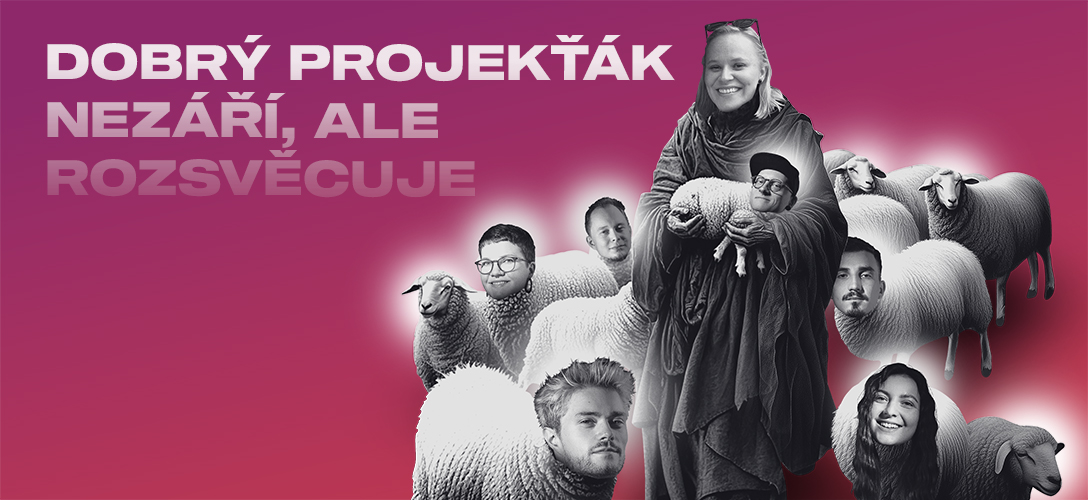A good project manager does not shine but lights up others
The agency world is always talking about performance, creativity and project management. But the more time I spend in my role as a project manager, the more I'm interested in another aspect - the less visible one. The level of trust, respect, calm and space. The one that not only determines whether a project successfully runs its course, but more importantly, the state the team is left in.
From manager to guide
Having manager in your job title doesn't automatically mean that people will listen to you with respect. Trust doesn't come with a title. It comes when a colleague knows they can approach you with uncertainties and comments, and are not expecting criticism but interest. When they know their perspective has value, even if it's different. This is not where the hierarchy begins, but the partnership.
In an agency, the project Manager is not the boss. He's the connection. A bridge between worlds. Between the client and the team. Between the brief and the output. He translates the language of expectations, picks signals out of the noise and holds the direction. And often doesn't get into the presentation and stays in the background. And that's okay. Because a good project manager doesn't shine, he lights up.

The art of extinguishing chaos
People in agencies don't burn out because they're too busy. They burn out because they don't know what's important. Because everything is on fire, everything has priority, and everything is constantly changing. But peace of mind is a head start. When the team knows what we're doing first, what can wait, and what's okay to not get done, focused work starts to happen instead of chaos. Performance without a big bang. And with that comes the quality.
It may sound like a low priority, but differentiating the important from the noise is one of the most important qualities a good project manager should have in their hard skills backpack.

Rest as part of the performance
Our industry is fast-paced. But not everything that's fast is efficient. I encounter this all the time - colleagues who jump from meeting to meeting, completing tasks at the weekends and scrolling through their briefcases in the evenings instead of taking time for themselves. But the head is not an infinite processor.
Rest is not a reward. It's a must! Micropause, mental switching, lunch with eyes fixed on the mobile screen or monitor. No way! Sometimes it only takes 10 minutes of being out of the system to restart and catch a breath.
That's why a project manager's job scope should include not only looking after the execution of assigned tasks, but also keeping an eye on the capacity and energy of the people in the team.
Assignment is a form of care
A good brief is not a 'tick box'. It is an act of care. For the team, for the project, for the client. When the brief is clear, there is room for freedom. When it's vague, energy is lost at the start.
A brief is not a fact sheet. It's a compass. It helps people understand what they're doing, why they're doing it, and what the meaning of it is. And most importantly, that they can question, disagree, and add their perspective. Because even a brief is a dialogue, not a command. A good brief creates a safe space in which courage can arise. Courage is a prerequisite for every good creative.
Team is not a spreadsheet. It's a feeling.
You can have a clearly defined mission, values on the website, beautiful presentations and exciting staff bonuses, but you won't identify the true strength of the team in how happy they look in the pictures from team building. It is found in how it makes people feel every day. They feel that they have a strong place in it, that their voice matters, and that they have room to grow.
And when most people on a team experience this, something powerful starts to happen. A team is not just a collection of individuals. It's an environment that empowers everyone - and thus strengthens the whole.

Difference is not a complication, but an advantage
At first glance, it is easier to have a unified team. But creativity is not a belt production. An introvert who remains silent during the meeting can come up with the most sophisticated solution. An analyst will point out a hole that others have overlooked. An extrovert will bring energy when others are struggling. The difference is not a complication. It's an advantage. But only if we're not afraid to let people work in their own way.
Leadership without words
Not every day brings a wow moment. Most of a project manager's work happens between the lines. In the way we react when something goes wrong, how we ask questions, how we recognise overwork, or how we notice that someone needs more time or recognition.
Leadership that inspires doesn't come from a rubber stamp. But from being present. And it is not driven by process, but by feeling.
My job is to create the conditions in which every member of the team can shine. That means less talking and more listening, and keeping the team together even when the world is a little shaky. And when things do go well? Taking a step back. Because success isn't solo. Success is always a team effort.

At WeBetter, we know that a good project isn't just about the destination; it's about the journey.
And it can be a peaceful one, even when the client is heading very high, especially when you have a team by your side that sticks together, doesn't collapse, sees things through, and still brings new ideas along the way.
We handle marketing without unnecessary drama, with perspective, a clear direction and a desire to push brands further.
If you're looking to collaborate on a project with a partner who feels the same way, get in touch.
Karolina Böhmová




